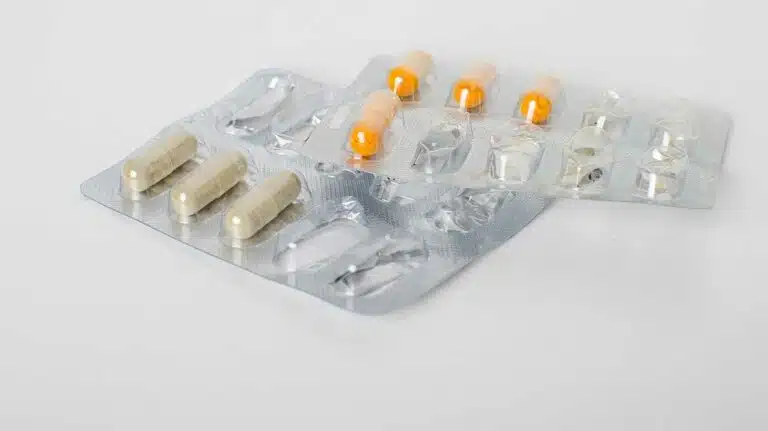Mixing Gabapentin & Adderall | Effects, Risks, & Precautions
- Effects Of Adderall
- Effects Of Gabapentin
- Risks
- Adderall Drug Interactions
- Gabapentin Drug Interactions
- Adderall Precautions
- Gabapentin Precautions

Adderall and gabapentin, two common prescription drugs, are not known to directly interact or interfere with one another at therapeutic doses.
However, the contrasting effects of these substances should be considered, especially in cases where Adderall is being abused in higher than recommended doses.
Effects Of Adderall
Adderall and Adderall XR are brand name stimulant medications made with a mixture of amphetamine and dextroamphetamine salts.
A schedule II-controlled substance and prescription drug, Adderall is prized for its ability to treat juvenile and adult ADHD (attention-deficit/hyperactivity disorder) and narcolepsy over extended periods of time.
However, Adderall and similar amphetamine/dextroamphetamine stimulants are frequently abused to increase concentration, suppress appetite, or provoke an addictive stimulant high.
Side Effects Of Adderall
Common side-effects associated with the use of Adderall include:
- headache
- dizziness
- increased wakefulness
- muscle twitching
- convulsions and seizures
- paranoia
- irregular or elevated heart rate
- loss of appetite and weight loss
- nausea
- sleep problems
- hallucinations
- sexual dysfunction
- depression
- anxiety
- dry mouth
- weakness
- constipation
- false sense of well-being
- chest pain
Effects Of Gabapentin
Gabapentin, in contrast, is a prescription anticonvulsant medication that acts as a gamma aminobutyric acid (GABA) analogue.
Inside the body, GABA and gabapentin both act as mild central nervous system depressants, reducing the excitability of neurons in the brain to reduce seizure activity and limit the transmission of pain signals.
Gabapentin is sold under brand names including Horizant, Gralise, and Neurontin. It is prescribed to prevent and control partial seizures, nerve pain, and moderate-to-severe restless legs syndrome.
Side Effects Of Gabapentin
Common side effects associated with gabapentin use include:
- fatigue
- dizziness
- headache
- nausea and vomiting
- fever
- difficulty speaking
- recurring infections
- memory loss
- weight gain
- tremors
- problems with balance and movement
- double vision
- unusual eye movement
- swelling of the feet and legs
Risks Of Mixing Adderall & Gabapentin
There are no known, direct drug interactions between Adderall and gabapentin, and the two are generally safe to take together if used as prescribed.
However, one of the potential side effects of amphetamine drugs like Adderall is a decreased seizure threshold.
Increased Risk Of Breakthrough Seizures
Those who use the drug are more likely to experience adverse effects related to convulsions and seizures, and those who abuse the drug in higher doses may be even more at risk. In fact, seizures are a common symptom of Adderall overdoses.
This works against the anticonvulsant properties of gabapentin, potentially limiting the drug’s effectiveness and triggering breakthrough seizures as a result. And, once again, this danger is greatest if Adderall is abused in higher doses for non-medical reasons.
Adderall Drug Interactions
Adderall is known to interact with a variety of different drugs and supplements, including:
- alcohol
- monoamine oxidase inhibitors (MAOIs)
- antidepressants (TCAs, SSRIs, SNRIs)
- triptans
- lithium
- buspirone
- certain opioids (fentanyl and tramadol)
- CYP2D6 inhibitors
- antacids
- H2 blockers
- urinary alkalinizers
- proton pump inhibitors
- bupropion
Some of the interactions may be more or less serious than others. Read the information provided with your prescription and check with your healthcare provider if you have concerns.
Gabapentin Drug Interactions
Gabapentin can interact with medications and other substances that also cause sedation or drowsiness. These include:
- alcohol
- opioid drugs (oxycodone, hydrocodone, etc.)
- benzodiazepine drugs (Klonopin, Xanax, etc.)
- sleep medications (Ambien, Edular, etc.)
- muscle relaxers
- antihistamines
- cannabis
Gabapentin medications may also interact with substances that contain magnesium or aluminums, including some over-the-counter drugs, antacids, and supplements.
Adderall Precautions
Adderall and similar medications like Vyvanse, Dexedrine, and Ritalin should be used by caution by those with a personal or family history of medical conditions such as:
- blood circulation problems
- certain mental health conditions like bipolar disorder or psychosis
- heart problems or disease
- heart abnormalities
- high blood pressure
- hyperthyroidism
- glaucoma
- seizures
- drug abuse
- uncontrolled muscle movements
Adderall can cause premature birth and infant withdrawal symptoms, as well as unwanted effects related to breastfeeding. Adderall may also temporarily suppress growth in children.
Gabapentin Precautions
Gabapentin should be used by caution by those with a preexisting history of kidney disease, mental health disorders including depression or suicidal thoughts, drug abuse, and breathing problems. It should also be used by caution by those who are pregnant or breastfeeding.
Gabapentin may also make you dizzy, drowsy, or blur your vision. Do not drive, use machinery, or engage in high-risk activities until you understand how the drug affects you.
To learn how our healthcare professionals address prescription drug addiction with inpatient or outpatient treatment options, please contact us today.
Written by Ark Behavioral Health Editorial Team
©2024 Ark National Holdings, LLC. | All Rights Reserved.
This page does not provide medical advice.
Food and Drug Administration (FDA) - ADDERALL XR (amphetamines) HIGHLIGHTS OF PRESCRIBING INFORMATION
Food and Drug Administration (FDA) - NEURONTIN (gabapentin) HIGHLIGHTS OF PRESCRIBING INFORMATION)
Journal of Experimental Pharmacology - Review about gabapentin misuse, interactions, contraindications and side effects
Questions About Treatment?
Ark Behavioral Health offers 100% confidential substance abuse assessment and treatment placement tailored to your individual needs. Achieve long-term recovery.
100% confidential. We respect your privacy.
Prefer Texting?
Our friendly support team is here to chat 24/7. Opt out any time.







 Learn More
Learn More








